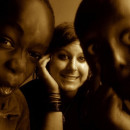Rwanda/Uganda: Experiential Learning Whether You're Ready for it or not. Past Review
By Caitlin L (Anthropology., Austin College) for
SIT Study Abroad: Rwanda - Post-Genocide Restoration and Peacebuilding
Yes. I learned a lot about myself and surprised myself with my own strengths. I learned so much from the lectures and research period too.
Review Photos


Personal Information
| How much international exposure did you have prior to this program? | 1 month - 6 months |
Review Your Program
|
* Overall educational experience
Academic rigor, intensity, resources, etc. |
Ugandan/Rwandan lecturers are extremely different from American lecturers: their style of teaching is just a lot different, and it takes a while to get used to. There seems to be a lot less focus on readings and prior knowledge in their lectures, which got frustrating sometimes when we'd heard the same things repeated twelve different times. Overall though, the lectures were very informative and the lecturers were eager to help us learn. |
|
* Host Country Program Administration
On-site administration of your program |
Both academic directors are awesome; they are both extremely educated about their particular country and were always happy to talk to us about anything. They both made me feel very comfortable and welcome and did a great job of arranging lectures, homestays, excursions, etc. However, the Uganda AD was not as accessible as the Rwanda AD, and he did not seem as involved in the overall academic aspects of the program. |
|
* Housing:
How satisfied were you with your living arrangements? |
Both of my host families were awesome; I loved my time with them and felt comfortable from day one. Both families were extremely welcoming and accepting and loved to hear about my life and what I was studying. They encouraged me in my research and were always around when I needed them. I loved my host family in Rwanda so much that I stayed with them for an extra month while I did my research project and it was a great decision. I was totally blown away by how well I fit into both families and the homestays ended up being my favorite part of my semester. |
| * Food: |
Both of my host families understood that I am vegetarian and were very careful to prepare dishes that I could eat. They noticed what I liked and didn't like and would sometimes stop serving whatever I didn't seem to care for altogether. There are plenty of cheap restaurants and cafes around that serve awesome local food, and there's plenty of places to grab some American food (of sorts) if you get sick of rice and beans! |
|
* Social & Cultural Integration:
How integrated did you feel with the local culture? |
We had so many awesome excursions; most of them were pretty serious but a lot of them also incorporated some fun. I loved all the cultural dancing and discussions we had with local people on these field trips. The homestay parties at the end of both homestays were also really fun. |
|
* Health Care:
How well were health issues addressed during the program? |
|
| * Safety: |
I never felt unsafe, ever. I felt very comfortable walking around on my own, especially because locals were always around to help me out if I got lost or had a question. |
| If you could do it all over again would you choose the same program? |
Yes
|
Finances
|
* Money: How easily were you able to live on a student's budget?
(1 = not very easy/$200+ on food & personal expenses/week, 2.5 = $100/week, 5 = very easily/minimal cost) |
|
| Not including program expenses, about how much money did you spend on food and other expenses each week? | I probably spent about $30 a week- food is really, really cheap in both countries, so that's not an issue at all. The mzungu internet cafes are where you have to shell out big bucks, so if you're planning on going there a lot, then plan on spending a lot more money. Bus rides are really cheap too, but buying air time for my phone sometimes added up. I never called America, but I know that it is reaaallyy expensive. |
| Do you have any general money-saving tips for future study abroad participants? | Eat at the local buffets; they're really cheap and really good! If you go to a market and make it obvious that you have a lot of money, you will end up buying a lot of crap you don't want because the locals are really good at overwhelming you and talking you into buying everything! |
Language
| * Did your program have a foreign language component? | Yes |
| How would you rate your language skills at the beginning of the program? | None |
| What was the highest level language course you had completed prior to departure? | None. |
| If applicable, to what degree did your living situation aid your language acquisition? |
|
| Language acquisition improvement? |
We had language classes in Uganda (Acholi) and Rwanda (Kinyarwanda) for about half the program; we had language teachers who taught us and gave small assignments and one final test. My host families in both countries always encouraged and helped me to practice their native language, and I learned the most from them and from my interactions with local people. In Uganda the majority of people know some English, but in Rwanda, English is much less common, so it definitely helps to try to gain a better understanding of their language. |
Other Program Information
|
* Where did you live?
Select all that apply |
|
|
* Who did you live with?
Select all that apply |
|
|
* Who did you take classes with?
Select all that apply |
|
A Look Back
| * What do you know now that you wish you knew before going on this program? | You definitely have to be open minded and ready to learn a LOT. If you're not prepared to interact with the locals, seek them out and talk to them, then don't even bother going, because you won't enjoy your semester. You have to be prepared to integrate yourself in the host culture, physically, emotionally, and socially. It is a truly awesome program, and I would encourage anyone with even a little interest in African issues to apply. |








